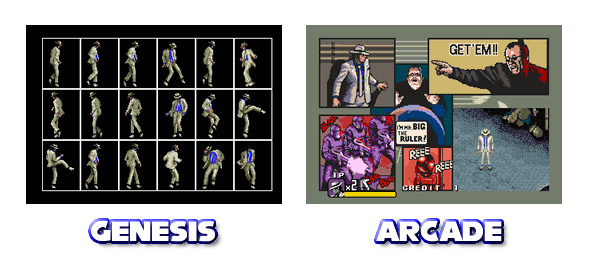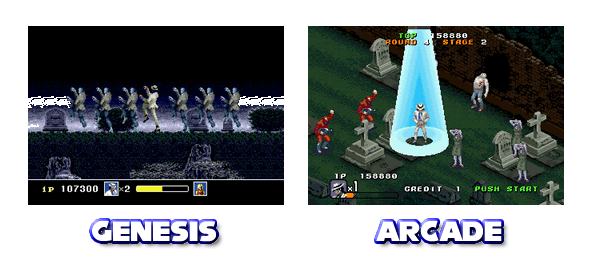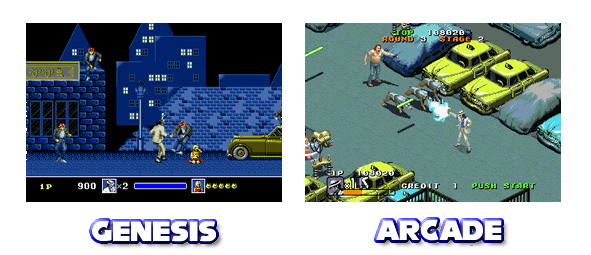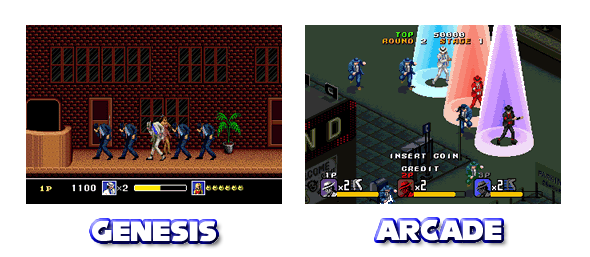When I originally experienced the Genesis version of Moonwalker, I was amazed at the animation and quality of the music. Mind you, this was long before it became creepy to see Michael Jackson and children onscreen at the same time, and though he was well on his way to becoming an old white woman, MJ’s music and dances were still a sight to behold. Though never a huge fan, I could definitely appreciate how much work and care went into making the game as authentic as possible.
 I suppose the biggest knock against Moonwalker is its plot, but most are likely judging it in light of Jackson’s recent legal troubles (his first child molestation case didn’t come to light until 1993, a good three years after Moonwalker was released). That’s entirely unfair, and it’s best to look at it in the context of what it was – a licensed game featuring one of the biggest names of the era. The first part of that last sentence is important to remember. Licensed game, a term that usually has gamers running for the hills, but it’s not at all a bad thing in this case.
I suppose the biggest knock against Moonwalker is its plot, but most are likely judging it in light of Jackson’s recent legal troubles (his first child molestation case didn’t come to light until 1993, a good three years after Moonwalker was released). That’s entirely unfair, and it’s best to look at it in the context of what it was – a licensed game featuring one of the biggest names of the era. The first part of that last sentence is important to remember. Licensed game, a term that usually has gamers running for the hills, but it’s not at all a bad thing in this case.
Moonwalker the film was essentially one big collection of music videos designed to show the world why MJ was the King of Pop. The plot was laughable, and anyone who thought that the prospect of Jackson transforming into a massive robot was cool, probably never saw the Transformers. Want an idea of how creepy this idea is? Wait just a bit, as Jackson himself wants to make it a reality. How’s a fifty foot, laser beam-shooting robot of him wandering around in the desert sound? Supposedly, he wants to make it happen.
The Genesis game was a fun but short romp, but it wasn’t the only Sega game bearing the name. An coin-op was also produced, and those of us unable to play it at the time assumed that the cartridge version was a port. This is not the case. Both games were produced simultaneously yet separately – both with Jackson’s input – but they are not related (aside from content). Many arguments have been made as to which was better, but let’s break it down and see which is which.
The Differences
Presentation: It’s obvious to anyone with eyes that the arcade game is graphically superior. Running on Sega’s powerful System 18 hardware, it was a feast for the eyes. The large, colorful sprites impressed more than a few gamers, I’m sure. Jackson, in his Smooth Criminal suit and fedora, uses his dance magic to take out foes, just as he does on the Genesis. His special dance attack is much more impressive on the arcade version, with a larger field of dancing and smoother animation for Jackson himself. The spotlight was a cool effect!
The coin-op also does a better job of conveying the “plot” by use of comic book-style cut scenes before each stage. The Genesis version only offers a quick animation of Jackson dancing, or simply his image accompanied by a “woo!” or “ow!” While these cut scenes may be downright campy, at least there’s an attempt to move the story along. Seeing Michael yelp over and over on the Genesis didn’t do much more than annoy me.

Edge: Arcade Game
Graphics: The arcade Moonwalker definitely has the upper hand, perhaps more than in any other area, as the visuals are more colorful and a lot more detailed. The isometric view also permits a larger play area, and there are just so many more enemies and items onscreen that the whole Moonwalker world comes to life. More pool tables, cars, tombs – every level is just so much larger and vibrant in the arcade game. Even the children themselves are better done on the arcade. In addition to the blonde girl that dominates the home game, the kids Michael saves are both black and white, and there are boys as well as girls.
By comparison, the Genesis installment looks kind of bleak in most areas, though there are stages where some good graphical work was done. Putting it next to the competition, however, you can easily see the difference. Another thing noticeable is the overall stiffness of the Genesis dance animations. Closer inspection of the other Moonwalker shows that most of the smoothness (no pun intended) is in Michael himself, and those around him dance quite stiffly, but it’s still much more fluid than on the Genesis. This almost takes away from the effect the great dance sequences are supposed to have in the first place.
Moreover, the variation of environments isn’t all that different between the two either. Dance club? Check. Street at night? Check. Graveyard? Check. Mr. Big’s fortress? Oh, you get the idea already. This similarity is naturally due to the source material, so both get good marks for trying to keep things geniune. MJ himself was behind the concept and game design, so you can be assured that things are true to his vision and style.

Edge: Arcade Game
Sound/Music: Another area where you’d think the game would benefit from being on arcade hardware is in the audio department. Strangely enough, this isn’t the case. Even with all the extra horsepower, the coin-op doesn’t sound all that much better. We all know that Moonwalker sounds great on the Genesis (despite the infamous sound issues the console has), but it does more than hold its own against its arcade sibling. The quality of the musical compositions, as well as the selection of pieces included, is pretty much the same in both renditions, and gamers will find their ears pleasantly soothed by either one. The digitized voices are a lot clearer in the arcade, and the songs take longer to loop, but the difference in quality is pretty isn’t all that great between the two. Sure, the arcade is more elaborate, but again, this is most likely the result of the differences in memory and power, so it’s not surprising.
I must, however, make it quite clear that neither version includes the song Thriller in the graveyard scene. Both instead have Another Part of Me, which older fans might remember as the song that played at the end of Epcot Center’s Captain EO 3D attraction (God, I’m old!). It’s been rumored that licensing issues forced its omission, but whatever the case, it’s pretty lame to fight zombies to a tune that originally had Michael dancing alongside muppets.
The distribution of the songs is a bit different as well. Billie Jean only appears in the arcade during the ending sequence (which is hilarious), and two versions of Bad are used in stages one and five. Both versions have Smooth Criminal for the club and Beat It for the streets stage.
Bad: Sega Genesis version (MP3 1.04 megs) Bad: Arcade version (MP3 2.13 megs)
Edge: Draw
Gameplay: Despite the difference in perspective, both Moonwalkers pretty much share the same premise and atmosphere. The main difference is that gameplay is more slowly paced on the Genesis, and you find yourself spending more time exploring than fighting. Each of the children you must find are carefully hidden, and you can’t advance to the next stage until you find them all. In contrast, the arcade Moonwalker is more action-packed and plays almost like a run-‘n-gun. There isn’t much emphasis placed on exploration, and it’s all about moving through the stages, wiping out enemies as you go along. There are children to be found, but it’s not necessarily the basis of each level as it is on the Genesis.
The two do share some elements of gameplay, but even then there are some changes. For example, Michael fires his “magic” at his enemies in both versions, but it’s more like electricity in the arcade. He can use his dance special to eliminate multiple foes by making them dance to death, but the sequence is less elaborate in the home version. There’s also a fundamental difference in how the dance magic itself is handled between the two, as seen in his ability to charge the attack in the arcade game, and that it takes away some of your life with each use on the Genesis. I prefer the way the Genesis handles this, since tieing the special to your life bar gives you multiple chances to use the magic. If you’re low on energy, saving some children will both replenish you and give you more magic. In contrast, the arcade game only gives you one magic attack in each level. Once it’s gone, you’re out of luck for the rest of the stage, unless one of the children you rescue gives you an extra. Since not all the children bear such an importan gift (some only replenish energy while others give nothing at all) this means you can essentially find yourself in a heap of trouble against bosses if you used your dance special earlier on. The Genesis cart at least gives you the chance to fill up your bar to face the boss fully stocked. Aside from that though, both feature the same objective of seeking out children to save as you navigate through areas from the film. Michael’s pet chimp Bubbles appears in both games, as does his robot form (it’s a lot more common to transform in the arcade iteration).
A big plus for the coin-op Moonwalker is its three-player feature. Watching three Michaels (the other two are red and black in color) prance around the screen can be a bit disorienting at first, but it’s great to be able to play along with two other people. I love the fluidity of the Genesis game, but multi-player is always a bonus. I wouldn’t consider it to be a deal breaker, as the Genesis game is just as much fun, even though you’re going it solo.
The arcade version also has a slightly larger variety of enemies, though it consists mostly of lame robots that don’t seem to fit. Of course, we’re talking about a game where Michael can even make dogs dance, so who am I to impose limits? There are many more boss battles in the coin-op as well, and they’re a lot better. Whereas you could use your dance special to simply wipe out the small group of enemies that assailed you on the Genesis, the arcade game has you fighting massive machines, hovercrafts, and robotic spiders. One minor gripe against the arcade game is that it doesn’t let you fight Mr. Big’s Doomsday Device as the spaceship, just like in the movie, while the cartridge Moonwalker does.

Edge: Arcade Game
Other: There’s not really much else to say in regards to major differences between the two. Even the arcade game’s rarity has been made moot through the ease of emulation, and the home version of Moonwalker is both readily available and relatively inexpensive on the Genesis. One thing that I’d have to note about both renditions is that they’re quite short (five stages). You can beat either one in under an hour, which seems to be long enough. Given the straight-forwardness of the gameplay, it’s actually good that things aren’t drawn out longer than they should be. This isn’t a knock, mind you, merely an observation. Many arcade games of the era tended to be quite long, in an effort to milk gamers out of as many quarters as possible, and all too few were actually beatable on a few coins. Moonwalker allows players to get the most out of their time without becoming a chore. The same can be said on the Genesis.

Edge: Draw
Final Assessment
As much as I hate to admit it, I have to give the victory to the arcade version of Moonwalker. To be fair, it’s not a major win by any means, and the Genesis cart does everything that really counts just as good. What tips the scales here is mostly technical in nature. The System 18 board is naturally superior to the Genesis, which itself is an adaptation of the System 16 hardware. This is nothing more than the natural effect of progress, and in no way is a reflection of the overall quality of the Genesis game. I guess that the larger selection of enemies and better bosses might also weigh in against the Genesis, but your mileage will vay as to just how big a difference this makes.
In my opinion, the Genesis Moonwalker is just as good in its own right as the other one is, and while it may lose out when we break down each version piece by piece, the overall message is that it’s really just as good a game. I recommend tracking down a copy, and I wholeheartedly support trying the arcade rendition via emulation if you can’t find an original PCB. Both are a great way to spend an afternoon, and you’ll no doubt find yourself coming back to them many times.
Moonwalker Arcade screen shots courtesy of Sydlexia.com.

Recent Comments